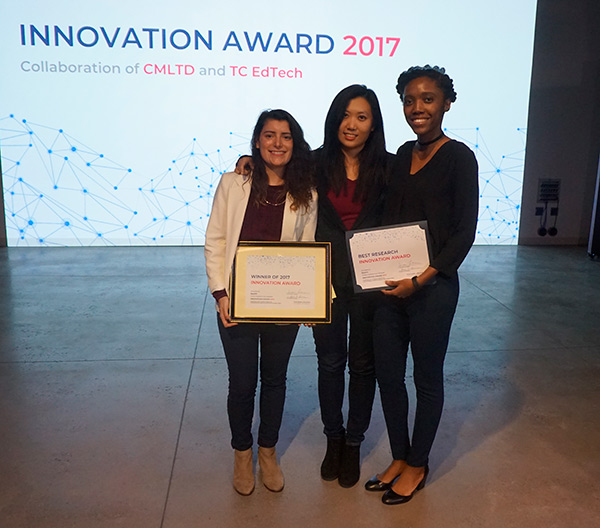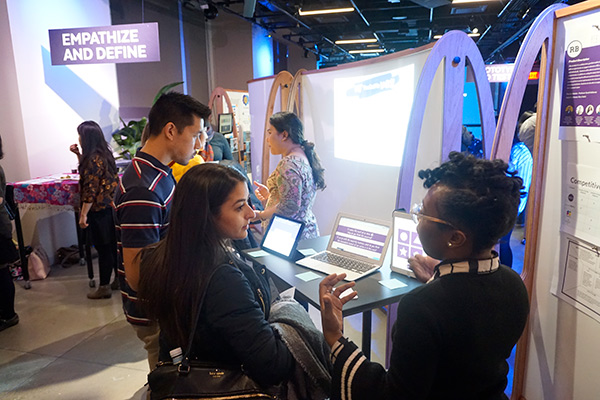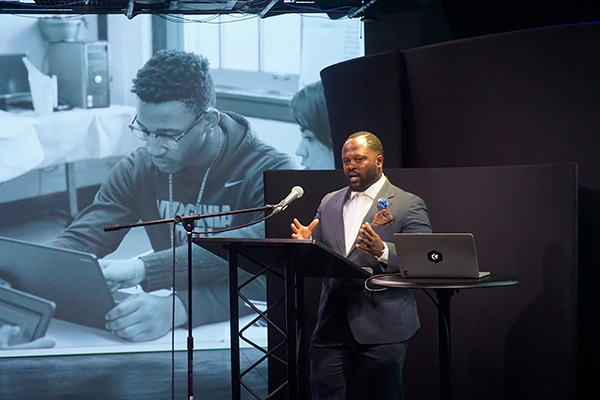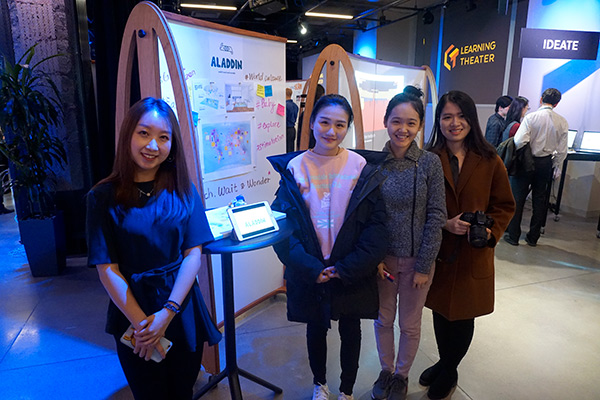There’s an App for That
TC’s EdTEch contest yields ideas for helping first-generation college students, promoting good parenting, teaching geography through play, and more

They are commonplaces in the brochures of institutions that accept large numbers of first-generation college students: snapshots of industrious young women and men in lab coats or studying with classmates on blankets spread across the verdant green of the campus quad.
What these pictures don’t capture is any hint of the homesickness, the difficulty in navigating a daunting system, the sense of being an outsider, the fear of failure or any other of the myriad challenges faced by newcomers to academia.
Enter “Best Fit,” an interactive app that enables 9th-12th graders to connect online with current first-generation students and ask them about campus life, academic rigor and other unknowns that loom large.
Developed by a team of Teachers College students – Asha Owens, Rebecca Kwee and Danielle Llaneza – “Best Fit” (which is not yet a commercial product) was the grand prize winner at Teachers College’s inaugural EdTech Innovation competition, which held its award Showcase ceremonies on December 13.
The “Best Fit” design bested 13 other finalists in the first-ever competition, which was supported by TC’s Communication, Media and Learning Technologies Design program, Office of the President and Office of Digital Learning.
The finalists included:
- “MindSlam,” a web-based platform for high school-aged communities to engage in meaningful conversation about news and civics.
- “PAGE,” an online language learning program for foreign students named the winner of the Best Pitch Award for clarity, delivery and supporting materials.
- “Aladdin,” an interactive play mat that helps teach geography. The project received “People’s Choice” honors from Showcase attendees.
- “Original Kids,” a parenting app that contains research-based theories and practices for supporting interactions with children and includes curated recommendations, tools and activities based on neuroscience, psychology, mindfulness and art.
- “Tuition$eed,” a mobile fundraising app, similar to GoFundMe, that, beginning in eighth grade, enables low-income students to raise funds for college tuition, moving costs, meal plans and books.
- “Math Heroes,” a gaming app to help struggling middle and high school students understand math and science.

“Ed tech products are often created without any expert feedback or understanding of the current educational theory,” Fuhrman said in her opening remarks to the Showcase. “It is often created to capture the usual technology metrics, such as how often people use the tool. But product development often bypasses or ignores other measures and criteria that would allow researchers to use the data to assess the product’s effectiveness.”
The Showcase and Innovation Award emerged from a call from TC President Susan Fuhrman to create a new way to develop ed tech tools that are based on research and incorporate specific domain expertise.
The creative firepower generated by TC research -- including student work -- positions the College to address the gaps that can separate product design from tangible outcomes in the classroom, Fuhrman added.
Miranda Meyerson, TC EDTech Coordinator, was tasked with creating a replicable way to build quality ed tech products. (TC EdTech is a College-wide effort to facilitate the development of effective, high-quality educational technology products and ensure that those brought to market serve students, teachers and institutions most effectively.)
Armed with a $6,000 “Rapid Prototype Grant” from the Office of Digital Technology, Meyerson turned to technology-minded TC faculty members and emerged with a proposal for a series of workshops to encourage student development of technology-driven designs. Faculty lecturers Joey Lee, Jin Kuwata and Yoo-Kyung Chang also worked on the grant.
The plan envisioned a collaborative effort with TC staff, outside experts and mentors culminating in a student showcase and awards ceremony. Down the road, the workshops could even serve as a prototype for a permanent EdTech campus incubator.

The Innovation competition drew no shortage of applicants.
A total of 20 teams, comprising 90 students, bid to become among the developers convening at the first workshop in mid-October.
The organizers combined several of the hopefuls, winnowing the number of entrants. Sixteen teams completed the process, with 14 chosen to present their platforms at the Showcase.
The workshops met on Friday afternoons and always drew a full house, even though the program was entirely voluntary and students earned no course credit for participating. The meetings were also attended by industry mentors, academic and business experts and TC faculty mentors from across the College.
Greg Devine, part of the Educational Technology Development team at Amazon, and former Sesame Street Workshop executive Sep Riahi, now CEO of the children’s trans-media company Global Tinker, were among the mentors.
The guest speakers and experts included Craig DiFolco, chief executive officer of BrainBase Communications and Angela Lee, Chief Innovation Officer at Columbia Business School.
The competition’s tight timeline did nothing to dampen enthusiasm for what Meyerson described as the process of observing each seed of an idea grow organically into plausible, functional web applications and programs.
The plan envisioned a collaborative effort with TC staff, outside experts and mentors culminating in a student showcase and awards ceremony. Down the road, the workshops could even serve as a prototype for a permanent EdTech campus incubator. “The idea was to connect design to educational theory,” Meyerson says.
“We adjusted what we were doing after every workshop by figuring out what worked and what didn’t work ,” says Meyerson.
Several of the teams were composed of combinations of students representing TC, Columbia and the Parsons School of Design.
But it was the all-TC “Best Fit” team that prevailed.
In their presentation to the EdTech Innovation Showcase, the team members predicted that “Best Fit” will one day transform “the way students and colleges find one another.”
The app taps the social media landscape by matching high school students with active college students via video and additional media platforms.
Kwee predicts the app will help remove the “stressful barriers” contributing to the prevalence of students who are accepted to college but ultimately neglect to enroll.
“They want to be part of the community,” adds Llaneza. “They don’t care so much about (enrollment) statistics. They want to know about the (college-going) experience.”
Unlike the long-standing projects and alliances forged by other Showcase entrants, Llaneza, Kwee and Owens were stranger until they were introduced at the first Showcase workshop.
Each brought a distinct perspective to the project:
Owens, a Brown-educated neuroscientist and a TC Instructional Technology & Media student, was the team techie.

And former Singapore teacher Kwee, a Higher & Post-Secondary Education major, added the element of real-life classroom experience.
The genesis of “Best Fit” began with Owens listening to a podcast on “Summer Melt,” a program that addresses the misgivings of first generation students who abandon the idea of attending college in the months following high school graduation.
“It inspired me to pursue an Innovation Award,” says Owens, a native of Columbus, Georgia.
The idea resonated immediately with Kwee and Llaneza.
By the time mentor Carol Barash began working with the team halfway through the process the three students had forged a powerful bond.
“They were respectful of one another, brought out the best in one another and were coachable beyond description,” says Barash, chief executive officer of “Story2,” a New York-based program that has facilitated the composition of personal narratives throughout the world.
The team did their best to balance the work on “Best Fit” with their studies and personal lives.
But “Best Fit” had a way of taking precedence.
“Over Thanksgiving break we were constantly making phone calls and texting about design,” says Kwee.
The payoff was a victory that earned the team posting of their findings on “Amazon Server Credits” and a $1,000 prize to be split three ways.
Even more significantly, the Innovation Award helped expand the team’s network – a major step toward one day making “Best Fit” available to high school students and their college counterparts.
Barash can see no reason why “Best Fit” and its creators won’t one day benefit thousands of young people who might otherwise journey from the path to post-secondary education.
“Miranda and the program positioned them for greatness,” said Barash. “They stepped into it, inhabited it and made it their own.” – Steve Giegerich
Making a Broader Mark
Two Teachers College teams that competed in the TC Innovation Award competition have been named to the top 20 among 250 entries for the ATOS/IT Challenge 2018, an international student competition dedicated to technological innovation. (Atos is a global IT services corporation specializing in high-tech transactional servers, unified communications, cloud, big data and cyber security services.) The focus of the 2018 competition is improving services with chatboxes (computer programs that conduct voice or text conversations enabled by artificial intelligence). The two TC entries are "EmQuo," a program to help users gain emotional intelligence skills and overcome workplace conflicts, and “MySulli,” a chatbox to respond and support middle and high school students who deal with cyber-bullying.
Published Thursday, Dec 21, 2017